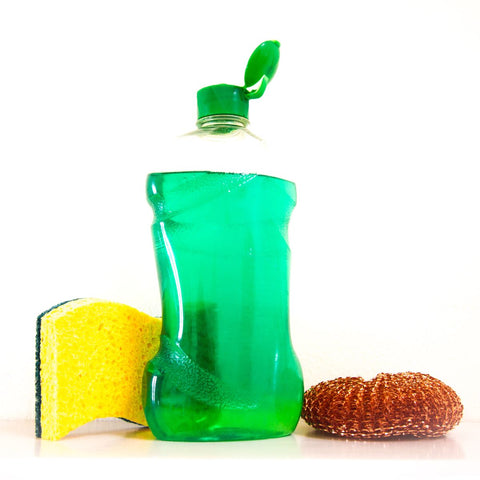Eco-Friendly Dishwashing Soap: How It Promotes Biodegradability
Written by Jazmine Roxas — September 26, 2023

It's easy to overlook the impact of everyday products on our planet. However, something as commonplace as dish soap can have a significant ecological footprint. In this article, we will explore why the best sustainable dish soap options should be on your radar. We'll break down the difference between conventional and eco-friendly dish soap, discuss the significance of biodegradable dish soap, and dive into what makes dish soap gentle on both your hands and Mother Earth.
The Hazards of Conventional Soap
Toxic Ingredients
Typical dish soap often has chemicals that are bad for both people and animals that live in water. These substances can lead to skin irritations and other health issues in humans while disrupting the natural ecosystems in water bodies. The following breakdown elaborates on the impact of each of these substances:
- Phosphates: Phosphates are key contributors to eutrophication, where excessive nutrients in bodies of water lead to dense algae blooms. These blooms block sunlight, disrupting the aquatic ecosystem. As algae decompose, they consume oxygen in the water, leading to hypoxic conditions that can cause large-scale die-offs of fish and other aquatic organisms. Phosphate pollution primarily originates from agricultural runoff and domestic cleaning products, making phosphate-free soaps a crucial step towards healthier waterways.
- Sodium Lauryl Sulfate (SLS): Its harshness can cause skin irritation, rashes, and allergic reactions, particularly in individuals with sensitive skin. Beyond human health concerns, SLS is toxic to aquatic life, with studies showing it can affect the reproductive and survival rates of species like fish and amphibians. The environmental persistence of SLS amplifies its ecological impact, emphasizing the need for biodegradable and less harmful alternatives.
- Triclosan: Originally developed as a surgical scrub for medical facilities, triclosan has found its way into numerous consumer products for its antibacterial properties. However, triclosan is a persistent environmental pollutant that can disrupt the hormonal systems of aquatic wildlife, particularly affecting thyroid function. Furthermore, its widespread use raises concerns about the acceleration of antibiotic resistance in bacteria, posing a long-term threat to human health. These risks have led some regions to restrict triclosan's use, pushing manufacturers to seek safer, more sustainable antimicrobial agents.
- 1,4-Dioxane: A byproduct of the ethoxylation process used in manufacturing surfactants and detergents, 1,4-dioxane is a likely human carcinogen. It does not readily biodegrade and can seep into groundwater, leading to contamination of drinking water sources. The presence of 1,4-dioxane in aquatic environments poses a carcinogenic risk to wildlife and humans alike. There is growing pressure on manufacturers to modify production methods to reduce or eliminate the release of this hazardous compound.
- Ammonia: In aquatic environments, ammonia acts as a potent pollutant that can lead to ammonia poisoning in fish, characterized by damage to internal organs, destruction of gill tissues, and ultimately, death. While ammonia is effective at cutting through grime and grease, its environmental toll suggests a critical need for using ammonia-free cleaning agents, especially in products that are likely to enter municipal water systems.
Choosing environmentally friendly cleaning products is more than a personal health choice—it's a necessary step towards sustainable living and preserving our ecosystems for future generations. By opting for products free from these harmful chemicals, consumers can help reduce the ecological footprint of their daily routines and contribute to a healthier planet.
Long-lasting Impact
When it comes to traditional dish soaps, many are not biodegradable. That's a big word that means they don't break down easily in the environment. When you wash dishes and the soap goes down the drain, it doesn't just disappear. It stays in the environment and can build up in rivers, oceans, and even the ground. Over time, these dish soaps can do lasting damage to places where animals live, like forests and rivers. This makes it even harder for these areas to recover and stay healthy in the long run.
Carbon Footprint
Regular dish soaps also have problems that affect the whole planet, like a high carbon footprint. The factories where they make these soaps often use a lot of energy. This energy use can release gases into the air that make our planet warmer. And there's more—these dish soaps often come in plastic bottles that are used only once. After you throw them away, these bottles can end up in places like landfills or the ocean. This adds to the growing problem of waste and pollution that we already have to deal with.
The Eco-Friendly Alternative
Why Biodegradability Matters
Opting for biodegradable dish soap means you are choosing a product that will break down naturally. Biodegradability minimizes the long-term environmental impact, as these soaps don't persist in our ecosystems. They're designed to be gentle on the earth, disintegrating back into natural elements over time.
Healthier Components
Plant-based dish soap is often made from natural ingredients like coconut oil or citrus extracts. These alternatives are not just effective cleaners; they're also less harmful to aquatic life. Unlike harsh chemicals, plant-based ingredients break down more quickly and pose less risk to the environment.
Lower Carbon Emissions
Eco-friendly soaps often employ less energy-intensive manufacturing processes. From sourcing raw materials sustainably to reducing waste during production, the goal is to minimize the carbon footprint. Sustainable packaging options like refill stations or biodegradable containers further reduce environmental harm.
Key Ingredients to Look For
Safer Surfactants
As discussed previously, most conventional dish soaps utilize strong chemical-based surfactants that, while effective in cleaning, can pose significant environmental hazards. These substances often fail to break down fully, leading to pollution in water systems and negatively impacting aquatic life. In contrast, eco dish soaps use surfactants derived from natural sources such as coconut oil, corn, or sugar. These plant-based surfactants perform essential cleaning functions but are biodegradable and much less harmful to the environment. By choosing dish soaps with safer surfactants, consumers can effectively clean their dishes while also contributing to the preservation of ecosystems.
Natural Additives
Traditional dish soaps are often packed with synthetic additives, including artificial dyes and fragrances, which can be harsh on the skin and cause environmental damage when they enter waterways. Gentle dish soaps, however, embrace a different approach by incorporating natural additives. Essential oils derived from plants such as lavender, lemon, and peppermint not only provide natural, pleasant scents but also possess inherent cleaning properties that enhance the soap's effectiveness. These natural additives are gentler on the skin, making them ideal for individuals with sensitive skin or allergies.
Moreover, by avoiding synthetic chemicals, these soaps reduce the chemical load entering sewers and natural bodies of water, ultimately supporting biodiversity and reducing toxic exposure to wildlife. Choosing the most natural dish soap is not just a personal health choice but a broader environmental stance, promoting sustainable and responsible consumer habits.
Look for Certifications
When searching for eco-friendly dish soap, it is wise to look for products that have been certified by reputable third-party organizations. Eco-friendly dish soaps are crafted to ensure they meet stringent environmental and ethical standards. To guide you in selecting the best options, here are expanded insights into the essential factors to consider:
- Certifications to Look For: It's important to choose dish soaps that boast certifications from well-respected organizations like EcoCert, USDA Organic, or Leaping Bunny. These certifications are not just for show; they ensure that the products comply with strict environmental and ethical standards. EcoCert, for example, certifies products that adhere to stringent ecological and organic standards throughout their ingredient sourcing and production processes. The USDA Organic seal is proof that a product contains at least 95% organically sourced ingredients, emphasizing support for organic farming practices. Meanwhile, the Leaping Bunny certification guarantees that no animal testing was used at any point in the product’s development, appealing to consumers who are against animal cruelty.
- Organic Ingredients: These ingredients come from farming methods that do not use synthetic pesticides or fertilizers, which are detrimental to both the ecosystem and human health. Organic farming supports soil sustainability, water quality, and biodiversity, promoting a healthier environment. Moreover, using dish soaps made from organic ingredients minimizes your household's exposure to harmful chemicals, making them a safer choice for everyday use.
- Environmentally Friendly Manufacturing: The manufacturing process of dish soaps should also reflect a commitment to environmental conservation. Opt for brands that utilize energy-efficient methods, sustainable or recycled materials in their packaging, and strategies that reduce waste and emissions. This approach not only minimizes the carbon footprint associated with production but also sets a standard for responsible manufacturing practices in the industry. By supporting such companies, you help promote a market that values sustainability both in product formulation and production.
- Chemical Safety: Ensuring that your dish soap is free from harmful chemicals is crucial. Certifications often indicate that a product does not contain parabens, phthalates, or synthetic fragrances, which can be hazardous to both human health and the environment.
- Cruelty-Free: The importance of cruelty-free certifications cannot be overstated. These certifications ensure that neither the final product nor its ingredients were tested on animals. This practice aligns with a growing consumer demand for ethical transparency in beauty and household products. You may demonstrate your opposition to animal experimentation by choosing cruelty-free dish soaps, which highlights the significance of compassion in consumer decisions.
It's about making informed choices that align with your values of environmental preservation and ethical responsibility. By considering these factors, you not only ensure a cleaner and safer home but also contribute to broader ecological and ethical impacts, making a difference one wash at a time.
Criteria for Selection
Transparency is Key
Companies that provide a comprehensive list of all components used in their products generally gain higher trust from consumers. This transparency allows consumers to make informed decisions, especially those concerned with environmental impact and personal health. By knowing exactly what's in their dish soap that is gentle on hands, individuals can choose products that are not only effective but also gentle on their skin and safe for the planet. This level of openness from companies often correlates with their commitment to consumer health and environmental stewardship. As consumers become more environmentally and health-conscious, they gravitate towards brands that can provide complete transparency about what goes into their products.
Packaging Matters
The environmental impact of product packaging is significant, and choosing dish soap with sustainable packaging is crucial for reducing waste. As the global community becomes more eco-conscious, many companies are now offering dish soaps in refillable containers or using recycled or biodegradable materials. By opting for these sustainable packaging options, you contribute to lessening the volume of waste that ends up in landfills. Additionally, sustainable packaging often uses fewer resources in production, reducing overall environmental impact. Prioritizing these options helps make your kitchen surface cleaner eco-friendly. Consumers are encouraged to consider the lifecycle of packaging when choosing their products to ensure a minimal environmental footprint.
Cleaning Effectiveness
There is a prevailing myth that eco-friendly products do not clean as effectively as traditional ones. However, many sustainable dish soaps available today debunk this myth by offering superior cleaning capabilities without compromising environmental values. When choosing a dish soap, it is beneficial to read customer reviews and seek recommendations to find products proven effective. Sustainable dish soaps are formulated to tackle grease and grime just as efficiently as their conventional counterparts, using environmentally friendly ingredients. These products ensure that choosing an eco-friendly option does not mean sacrificing quality.
Company Values
The commitment of a company to sustainability can significantly influence consumer choices. It is important to research not just the eco-friendliness of a product but also the overall environmental policies and practices of the company behind it. Companies that transparently communicate their sustainability efforts, including resource management, waste reduction, and ethical sourcing, are more likely to be genuinely committed to environmental stewardship. By choosing such brands, consumers support broader environmental objectives beyond just product use. This approach helps foster a market where corporate responsibility is paramount, encouraging more companies to adopt sustainable practices.
The choice of dish soap extends far beyond mere preference for scent or suds; it is an important decision with far-reaching implications for our health and the environment. By opting for eco-friendly dish soaps, consumers can avoid the detrimental effects of hazardous chemicals and embrace products that are kinder to both our bodies and the planet. These sustainable alternatives are not only effective in cleaning dishes but also support the integrity of our ecosystems by being biodegradable and less harmful to aquatic life. Ultimately, each purchase of eco-friendly dish soap is a step towards a more sustainable future, highlighting the role of informed consumer choices in driving significant environmental change. This simple switch in our daily routine can be a powerful act of advocacy for a cleaner, healthier world.


